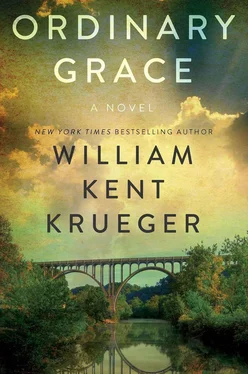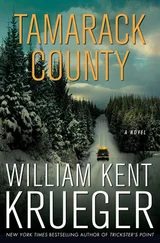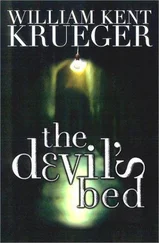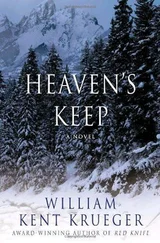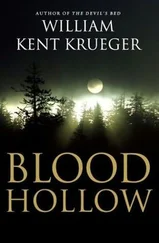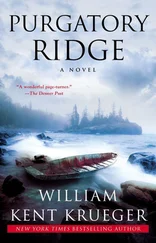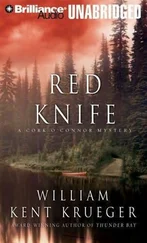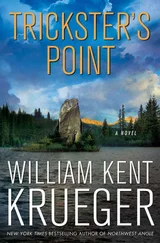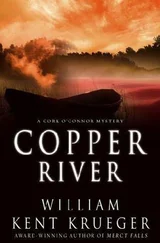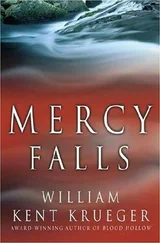William Krueger - Ordinary Grace
Здесь есть возможность читать онлайн «William Krueger - Ordinary Grace» весь текст электронной книги совершенно бесплатно (целиком полную версию без сокращений). В некоторых случаях можно слушать аудио, скачать через торрент в формате fb2 и присутствует краткое содержание. Жанр: Триллер, на английском языке. Описание произведения, (предисловие) а так же отзывы посетителей доступны на портале библиотеки ЛибКат.
- Название:Ordinary Grace
- Автор:
- Жанр:
- Год:неизвестен
- ISBN:нет данных
- Рейтинг книги:4 / 5. Голосов: 1
-
Избранное:Добавить в избранное
- Отзывы:
-
Ваша оценка:
- 80
- 1
- 2
- 3
- 4
- 5
Ordinary Grace: краткое содержание, описание и аннотация
Предлагаем к чтению аннотацию, описание, краткое содержание или предисловие (зависит от того, что написал сам автор книги «Ordinary Grace»). Если вы не нашли необходимую информацию о книге — напишите в комментариях, мы постараемся отыскать её.
Ordinary Grace — читать онлайн бесплатно полную книгу (весь текст) целиком
Ниже представлен текст книги, разбитый по страницам. Система сохранения места последней прочитанной страницы, позволяет с удобством читать онлайн бесплатно книгу «Ordinary Grace», без необходимости каждый раз заново искать на чём Вы остановились. Поставьте закладку, и сможете в любой момент перейти на страницу, на которой закончили чтение.
Интервал:
Закладка:
It was quiet in the church when he finished and the breeze that swept through the open doors cooled us and the flowers beside the coffin rustled as if someone had passed by.
Then Gus stood up.
He stepped into the aisle and walked to Bobby’s coffin. He put his hand on the polished wood. My father if he was surprised or concerned didn’t show it. He said, “Gus, is there something you’d like to say?”
Gus stroked the coffin as he might have the soft fur of a dog. I saw that his body was shaking and I understood he was crying. Someone in the congregation gave a cough. It sounded phony, as if it had been done to break the moment. What it did was make Gus turn and face them.
He said, “Bobby used to help me take care of the cemetery sometimes. He liked the quiet. He liked the grass and the flowers. To me and you he wasn’t much of a talker, but he used to whisper to the headstones like he was sharing a secret with the folks buried there. Bobby had a secret. You know what it was? It took nothing to make him happy. That was it. He held happiness in his hand easy as if he’d just, I don’t know, plucked a blade of grass from the ground. And all he did his whole short life was offer that happiness to anybody who’d smile at him. That’s all he wanted from me. From you. From anybody. A smile.”
He looked back at the casket and anger pulled his face into sudden lines.
“But what did people offer him? They made fun of him. Christian folks and they said things to him hurtful as throwing stones. I hope to Christ you’re right, Captain, that Bobby’s sitting up there in God’s hand, because down here he was just a sweet kid getting his ass kicked. I’ll miss him. I’ll miss him like I’d miss the robins if they never came back.”
His face was a melt of tears. I was crying too. Hell, everybody was crying. My father held his composure and, when Gus had returned to his pew, said, “Would anyone else like to offer something in memory?”
I thought about getting up. I thought maybe I could tell them about Bobby at the back of the classroom in first grade. The teacher didn’t work with him much. She gave him clay and Bobby spent his time at his desk carefully rolling out snakes which he arranged in rows, and every once in a while he would look up while the rest of us recited the alphabet and added two plus two, and his myopic eyes behind those thick, gold-rimmed lenses seemed contented. And I thought about telling them how I’d figured Bobby was hopeless but I was wrong and Gus was right. Bobby had a gift and the gift was his simplicity. The world for Bobby Cole was a place he accepted without needing to understand it. Me, I was growing up scrambling for meaning and I was full of confusion and fear.
I didn’t stand up. I didn’t say anything. Like everyone else I sat there dumb until my father offered a final prayer and Ariel began playing the final hymn and my mother stood up in her red satin robe and gave voice to the finality of it all.
And when she’d finished I heard the black hearse idling outside the open church door and everyone stood to follow Bobby to the hole Gus had already dug for him in the cemetery.
3
Something fishy about that boy’s death,” Doyle said.
It was Saturday afternoon, the day after Bobby Cole was buried. Jake and I had spent all morning working on my grandfather’s yard. Mowing, clipping, raking. Chores we did every Saturday that summer. My grandfather had a big house on the Heights with a yard that was a beautiful green sea of thick grass. He was in real estate and claimed that the look of his own property said as much about him as any piece of advertising he put on a billboard. He paid us well but he oversaw our every move. By the time the job was done I never thought the money was enough.
Always when we were finished-hot and sweaty and covered in grass clippings-we hit Halderson’s Drugstore where we could belly up to the soda counter for root beer served in a frosty mug.
At the back of the drugstore was an open passage to a storeroom. More often than not a curtain hung across the doorway but not that afternoon. I could see three men in the yellow light of a bare bulb that hung from the ceiling of the back room. They sat on crates. Two of them drank from brown bottles which I was pretty sure held beer. The one not drinking was Mr. Halderson. One of the other men was Gus. The third was the off-duty officer we’d met at the police station. Doyle. It was Doyle who was talking.
“I mean the kid was slow sure. But he wasn’t deaf. He’d have heard that train coming.”
“Maybe he fell asleep,” Halderson said.
“On the railroad tracks? Be like lying down on a bed of nails like one of them sheiks.”
“Fakirs,” Gus said.
“What?”
“They’re not sheiks. They’re fakirs.”
“Whatever.”
Doyle drank long and noisily.
“All I’m saying is that there’s more to that kid’s death than anybody knows. I’ve picked up plenty of bums on those tracks. I mean guys no mother would claim. Got sickness in their heads you wouldn’t believe.”
“Surely they’re not all like that,” Halderson said.
“All it takes is the wrong one at the wrong place at the wrong time. That boy he was so simple he would have been easy pickings.”
Gus said, “You really believe that?”
“The things I’ve seen during my years in uniform would make your stomachs turn,” Doyle said. He tipped his bottle to his lips but caught sight of me and Jake at the counter, both of us clearly eavesdropping. He lowered his beer and waved us to him. “Come on over here, you two.”
Jake looked at me. Joining these men was the last thing he wanted to do. I didn’t mind the possibility of getting in on that backroom conversation. I slid off my stool. Jake followed but he followed slowly.
“You’re the preacher’s kids right?”
“Yes, sir.”
“You ever play down on them railroad tracks?”
It was the same question he’d asked a few nights before in the police station. I didn’t know if it was the two empty beer bottles sitting beside his crate that made him ask or if he’d forgotten that he’d asked or if he’d forgotten the answer I gave when he asked or if this was just what a cop did asking the same question over and over to see if he could confuse you. I wasn’t confused.
“No,” I lied. Just as I had before.
He had a wide jut of flat cliff for a forehead and in its shadow his eyes shifted to Jake. “You?”
Jake didn’t answer.
“Well, boy?”
Jake’s mouth twisted and he tried to reply.
“Come on, spit it out.”
“He stutters,” Gus said.
“I can see that.” Doyle spoke sharp. “Tell me the truth, boy.”
Doyle must have scared the piss out of Jake. In a way that was painful to bear my brother tried to comply. He contorted his face and looked at Doyle out of deep creases filled with the dark anger that came from his frustration. He finally gave up and fiercely shook his head.
“Yeah, right.”
I hated the man for that. For putting Jake through torture and then dismissing the result.
Gus said, “Their father doesn’t let them play on the tracks.”
“You think they don’t go there anyway?” Doyle shot me a look that seemed to contain a whisper of conspiracy, as if he knew me and didn’t entirely condemn me for what he knew. As if in a way we were brothers.
I took a step back, hating the man more every minute. “Can we go?”
“Yes.” Doyle dismissed us as he might have a couple of suspects he’d decided not to collar.
I put my arm around Jake who was staring angrily at the floor and I turned him. We left the men. Left Doyle laughing quietly and meanly at our backs.
Outside the day sweltered. The sun threw heat from above and the sidewalks gathered it and roasted the soles of our sneakers. The tar that filled the cracks on the pavement had turned to black goo and we were careful to watch our step. We passed Bon Ton’s barbershop where the easy voices of men and the scent of hair oil drifted through the open door. We passed the bank which had been robbed by Pretty Boy Floyd and Ma Barker’s boys in the thirties and which had long been the source of a good deal of my own daydreaming. We passed store after store deserted in the drowse of that hot day in late June. We kept to the shade of the awnings and didn’t talk and Jake stared at the sidewalk and fumed.
Читать дальшеИнтервал:
Закладка:
Похожие книги на «Ordinary Grace»
Представляем Вашему вниманию похожие книги на «Ordinary Grace» списком для выбора. Мы отобрали схожую по названию и смыслу литературу в надежде предоставить читателям больше вариантов отыскать новые, интересные, ещё непрочитанные произведения.
Обсуждение, отзывы о книге «Ordinary Grace» и просто собственные мнения читателей. Оставьте ваши комментарии, напишите, что Вы думаете о произведении, его смысле или главных героях. Укажите что конкретно понравилось, а что нет, и почему Вы так считаете.
